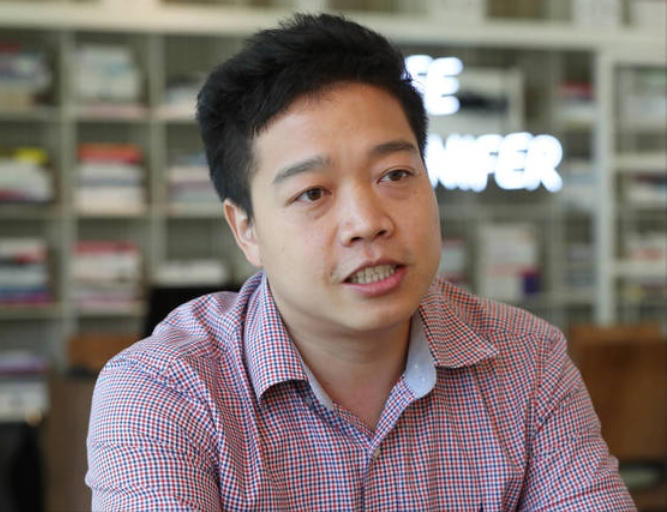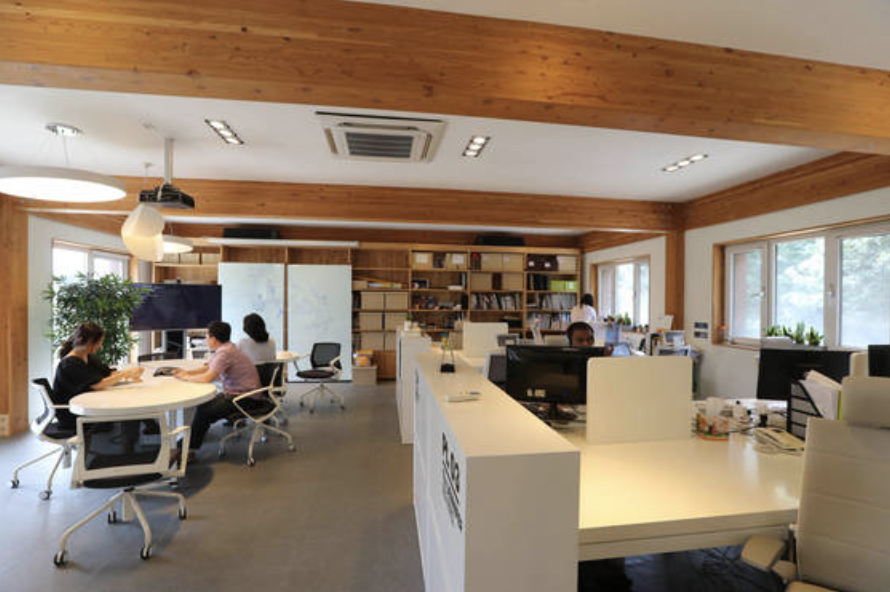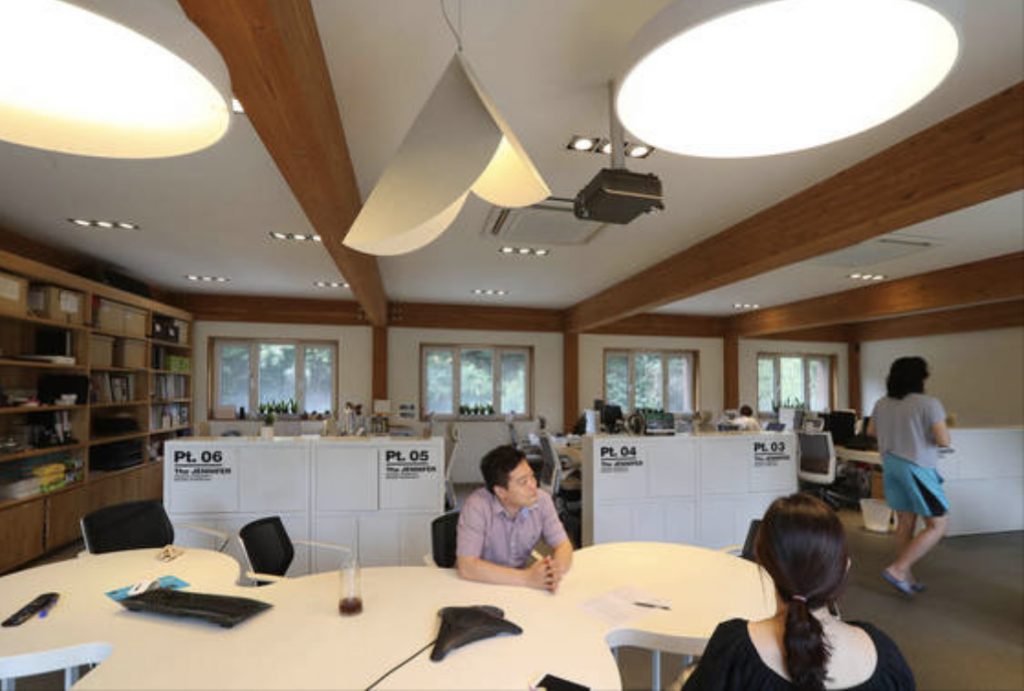JenniferSoft is called ‘a dream company’
Is JenniferSoft a dream company?
No one is told what to do, and swimming is regarded as working time.
[Hyun-chul Lee, Vice President, explains the interesting experiment of JenniferSoft]
A 35-hour week, with exceptional benefits.
‘Find what you need to do at work’ culture.
It takes six months to a year to get used to the corporate culture.
A company does not need to grow.
An individual sets a goal, not a company.
JenniferSoft is located in the middle of Heyri Art Village, Paju. When I visited the office for the first time, I did not realize this place was its HQ. A building with one floor below and three above the ground looks no different from a café. When I opened the door, a huge dog, Philip, welcomed me with his wagging tail. He was an abandoned dog who wandered around the town, but he came to the office three years ago. He chose JenniferSoft as his home. I interviewed Mr. Hyun-chul Lee, VP of JenniferSoft, at Jennifer Café, located on the first floor, while Philip took a nap.


Hyun-chul Lee, VP of JenniferSoft, explains the blind recruitment in HQ.
“Employees are frequently coming down to the first floor to get a coffee. Employees and their families can enjoy all the food at the café during the weekday, and weekends as well, for free.”
Some of JenniferSoft’s benefits that led to it being called a ‘dream company’ include:
New employees receive four weeks of paid leave (20 days), eight weeks of unpaid leave, 3 million won of flexible benefits a year, two years’ maternity leave for women, and 10 million won for the birth of each baby. The company also supports other expenses such as food, snacks, transportation, communication, and books. Employees and their families are welcome to spend time together in the office and at the swimming pool.
What is really surprising to many people is that working hours are 35 hours a week and even time spent swimming is included in the working hours. The swimming pool is located in the basement of the first office. A stack of towels is available on the first floor for employees to use at the pool.
The public at large may not know JenniferSoft, as most of its customers are business clients, not individuals. The company is well known for having top-level technology, and major firms including Samsung Electronics frequently visit the office. They mainly come to see the corporate culture, benefits, and working space of JenniferSoft.
The company rarely has contact with the media nowadays. After Mr. Won-young Lee appeared in a program called The Condition of a Leader in January 2013, the company became famous across the country.
The company was flooded with requests for interviews.
However, JenniferSoft has declined interviews for a few years.
Mr. Hyun-chul Lee, VP of JenniferSoft, said:
“Although JenniferSoft is a software company, they only took an interest in the company benefits and the corporate culture.”
He agreed to have an interview this time, saying
“We were asked to share the experience of blind recruitment. We felt it would be good to share such an experience, and we wanted to be helpful.”
During the interview with him about blind recruitment, the interview led on to the corporate culture. The recruitment philosophy of JenniferSoft is keenly linked to its corporate culture.
Find your own work by yourself.
You started running an internship program last year. Have you hired a permanent employee from the interns?
“There was one intern we wanted to hire; however, he got a job offer from another company and decided to join. Sometimes an interview could go up to four or five rounds: it took over seven hours, including having a lunch together. Over the course of the interview, applicants, too, may feel that they are not suited to our company. Although it is difficult to get a job these days, applicants may feel differently once they have joined the company.”
You started running an internship program last year. Have you hired a permanent employee from the interns?
“There was one intern we wanted to hire; however, he got a job offer from another company and decided to join. Sometimes an interview could go up to four or five rounds: it took over seven hours, including having a lunch together. Over the course of the interview, applicants, too, may feel that they are not suited to our company. Although it is difficult to get a job these days, applicants may feel differently once they have joined the company.”
A global marketer you hired in 2013—is he still with you?
“No, he quit. We did a blind recruitment without even asking about his English test. He was not sufficiently able to communicate in English. We sent him to Europe to study English, but he decided to leave us, saying the job was not suitable for him.”
Around 2,400 applicants applied for the post of global marketer. JenniferSoft did not ask applicants to submit their English test, but requested only two essays—one titled ‘How do you live?’, the other ‘Describe and critique your talent and experience’—along with interviews. The company believes that speaking English does not matter as long as applicants have a basic grounding. Yunhee Kim, Head of Marketing, says “the blind recruitment was a test for the company.”
JenniferSoft is known to be a great company to work for, but there must be exceptions.
“Our company may be too autonomous for some to adapt to. When new employees come into the office, they are asked to find jobs they need to do. We do not give them specific tasks. Once we start giving a job, we have to keep telling them what to do. A company is not able to decide all the details. It normally takes six months to a year to fully get used to our environment. No one tells them what to do.”
JenniferSoft does not designate tasks. Many newcomers might find it difficult to find jobs by themselves.
“The current educational system made them who they are today. We were all asked to study curriculums decided by others, and were forced to choose a right answer. We were not raised in an environment where we study and do something with our own efforts. It is totally understandable that they feel confused when coming to our company. Some companies hire a talented developer and ask them to make them a few slides for a presentation. JenniferSoft is not one of those companies.”
“The current educational system made them who they are today. We were all asked to study curriculums decided by others, and were forced to choose a right answer. We were not raised in an environment where we study and do something with our own efforts. It is totally understandable that they feel confused when coming to our company. Some companies hire a talented developer and ask them to make them a few slides for a presentation. JenniferSoft is not one of those companies.”

Visitors from a major firm were surprised to notice empty seats. In particular, they were not used to people drinking coffee on the first floor in the middle of the working day. When I visited the second floor to take a photograph, only a few employees were at their desks: “We basically work for 35 hours a week, and most employees come in at 10am and leave at 6pm. Newcomers feel sorry when they are late by about ten minutes, saying ‘sorry for being late’. But no one cares.”
More and more companies are adopting a flexible time system and encouraging their employees to use it.
“It may take time to fully get used to the system, but we all are going to be heading that way ultimately. They will also adopt blind recruitment further down the road.”
Is it true that no one knows which school a candidate graduated from when using blind recruitment?
Yunhee Kim, Head of Marketing, says “No one asks, and no one cares. In the middle of a conversation, it happens, you know, that the guy next to me looks like he studied a certain major.”
Hyun-chul Lee, VP of JenniferSoft, says: “A few years ago, I looked through the educational history of our employees to enroll our company as a defense industry company, because the government offers benefits if there are employees with a Master’s degree or a Doctorate in the R&D department, so I checked to see if any of our team members had such a degree. Turns out, no one graduated from graduate schools. There were a few college dropouts. I hesitated for a moment about whether to hire two PhDs in R&D.”
You had to hire graduate students to be enrolled as a defense industry company. Isn’t it against the policy of blind recruitment?
“JenniferSoft was not famous then. Once selected as a defense industry company, we were able to hire more talented employees. But now we do not need to do so.”
According to Lee, blind recruitment is not the answer for all companies.
He says:
“It is inevitable that some companies must look for applicants with a certain qualification—for instance, tax accountants. Most ordinary companies like us do not need such qualifications. Of course, it is reasonable to believe that an applicant with excellent qualifications will work well. If you were the top student out of a million, you must be competent. But not everyone has to be the top to work. Just because you didn’t do well at a school, it doesn’t necessarily mean there is a huge gap in their abilities at work between the top and the rest.”
Why keep changing the way of recruitment?
Will you explain why JenniferSoft keeps changing its method of recruitment?
“We are constantly working to improve the method, because the current way of hiring could be wrong. We used to make up algorithm questions when hiring developers. After hiring them, we noticed that almost half of them came from Samsung software membership. Samsung recently benchmarked Google in its hiring process. They started giving algorithm questions to applicants. Students who have an interest in software received a private education to answer the questions.
“If applicants solved the questions we provided, they could be highly capable of doing well at work. But there must be others who could not solve the problem, but they are still capable. For all this time, we thought giving algorithm questions could have a good role in hiring talented applicants, but if people are studying just to get a job here, it is time to change the method. Giving algorithm questions is not a bad way, but it is not the best one now.”
If there is no good way, don’t you keep hiring in the way that you used to do?
“No. if there is no another way, we still try to do something new. How can I be sure without even trying? I am thinking of using a live coding test to hire a developer next time. The test will be recorded to see where applicants search, and what kind of tools they use.”
Where do you get such an idea? From overseas cases? Or internal discussion?
“We use whatever means necessary to find a way. We look through overseas cases, too. For the live coding test, when we were planning and researching, we thought of recording the process of making a prototype and presenting it to a virtual client. At the moment, I feel such a method could be a good way to hire developers. How we choose the right person for us is important; however, what also matters is our capability. We could give applicants a probation period of two months and then decide whether to hire them, but it would be a difficult time for both of us. Instead, we came up with the idea that four people were hired to work for two months.”
If the hiring process is different every time you decide to hire, the annual income must be different for employees. How do you decide the payroll?
“Deciding payroll is also one of our concerns. We have been trying new things. Most companies in Korea use a relative evaluation with different grades. A person with an A grade gets more, and a person with a D grade gets less. It looks easy to decide the payroll by employee. But what if all the employees are exceptional? How would you distinguish between A and D? The goal of evaluation is also important. To make employees do better needs to be the goal, not graded payment. But companies keep ranking their employees instead of giving them advice. If their employees are not doing well, companies are supposed to say, ‘You need to do better on this—what can we do for you?’ I don’t think it is good to link the sales of a company and its payroll. What it should focus on is how each employee can grow. We believe that there is no need for a company to grow.
“An individual needs to grow, not a company.”
It is not necessary for a company to grow?
“I don’t think a company should always grow. But each person should grow. Personal growth will lead to better results. Companies in general set goals and make each department reach the goal. They will do important tasks; however, there’s a fair amount of red tape as well. For instance, they apply themselves to sales for the next year to meet their goal. If they focus on personal growth, each employee will come up with various ways to improve themselves. All a leader needs to say is ‘you need to more focus on this’ after reviewing various options.”
What you mean is that the direction is different when setting up a goal? Bottom-up, not top-down?
“No. this is not about a different direction. It is more about a different source. People say a leader should lead the way with a good idea. To do so, a leader should be excellent. What I am saying is the leader should carefully listen to what team members say and encourage them to focus on one direction. Self-motivation is essential to grow by themselves to make a creative organization.”
Job seekers give favorable feedback to the company as it e-mails even those who did not pass the hiring process. JenniferSoft does not send emails with stock phrases like ‘We’re sorry to inform that we are unable to grant you employment in our company. Thank you for submitting your application to us.’ Instead, JenniferSoft customizes the email to each applicant. Given that hundreds or thousands of people apply, writing an email to each of them is hard work.
“I well know how desperate they are. You just can’t send the same email to them”(Kim).
“After having an interview for several hours, I feel attached to them. Each team member discusses who sends whom an email” (Lee).
Many applicants want to know the reason why they didn’t make it. Do you also explain the reason when you send an email?
“No. I do not write such reasons. One applicant tells me, “I answered the questions you gave, but I don’t understand why I didn’t make it.” Once I start answering such a question, we would end up having a long discussion about what is ‘right’. Applicants might get angry. So we do not write about why they didn’t make it. We send a sincere email from our heart.”

I wanted to take a group photo with all the employees before the interview, but I could not do it, because asking someone to do something that is not relevant to their job cannot possibly be accepted in JenniferSoft’s culture.
A few years ago, I was asked to take a photo and asked every member to get together for a group photo once. On that day, Mr. Lee sent an email to every employee. He said “I feel sorry to ask all of you to be a part of the photo as it has nothing to do with your work. It won’t happen again.” I could not help but respect the corporate culture of JenniferSoft. As a result, you see employees hanging around the office freely this time.
